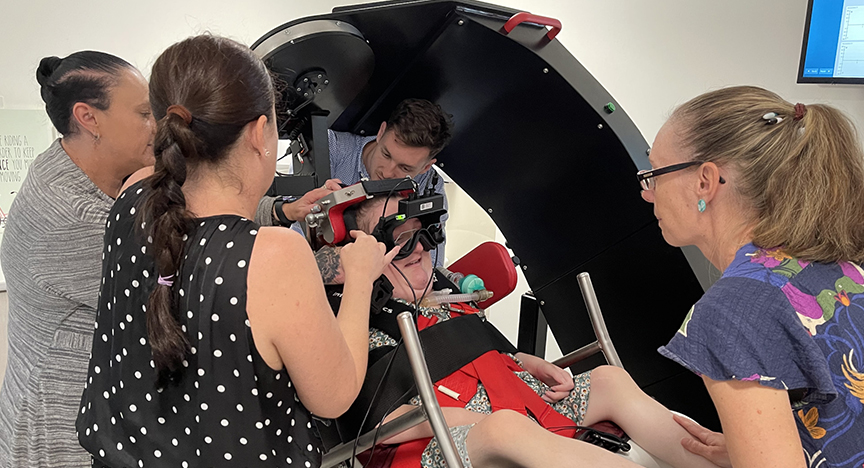
A 13-year-old girl from Logan has become the first person in Australia with a ventilator-dependent spinal cord injury to undergo a vertigo assessment in Queensland’s only Multiaxial Rotational (TRV) Chair at Logan Hospital.
The remarkable teenager, who sustained life-changing injuries at age three, also suffered from debilitating positional vertigo.
Until now, Abi Wilkinson's complex care needs had prevented adequate testing, but after a year of planning, and a spin in the chair at Logan Hospital, she was now well on her way to becoming vertigo-free.
Consultant Vestibular Physiotherapist Leia Barnes and Advanced Vestibular Physiotherapist Ethan Marrinan joined Abi’s ‘village’ of healthcare professionals late last year and together with a large team, co-ordinated the extraordinary medical feat.
Leia said in the world of vertigo assessment, it didn’t get more complicated than Abi’s case, with extreme anxiety adding to her physical complexities such as requiring a ventilator to breathe.
She said experts from multiple health sectors and facilities came together to make the appointment for Abi possible.
“The team included clinicians from Queensland Children’s Hospital, Logan Hospital, Queensland Paediatric Rehabilitation Service, private sector neuropsychology, a private sector personal carer and very importantly, mum Tanya,” Leia said.
“While Abi was in the chair, there were six people providing hands-on assistance, with a clinical neuropsychologist online, a paediatric anaesthetist on the phone and an on-site ENT surgeon on standby in the event of airway compromise.
“Whilst there was no sign of active Benign Paroxysmal Positional Vertigo (BPPV) we still achieved the extraordinary outcome of Abi realising she had the fortitude and strength to complete the assessment despite extreme fear and anxiety,” she said.
After successfully completing the Australian-first procedure and according to mum Tanya, changing her little girl’s life, Leia and Ethan said they were excited at the possibilities that now lay ahead.
“We have changed the landscape of what is possible for patients with positional vertigo and complex care requirements,” Leia said.
“From the planning of Abi’s session, we have now treated several people who use a wheelchair full-time, including a patient with cerebral palsy and someone with a C5/6 spinal cord injury, both of whom are now vertigo free.
“We have opened doors into an area of care that haven’t been opened before, enabling improved access to healthcare for patients with complex care needs.”
Both physiotherapists said Abi’s treatment perfectly showcased how working together helped people feel safe, heard, and empowered to manage their own health journey.